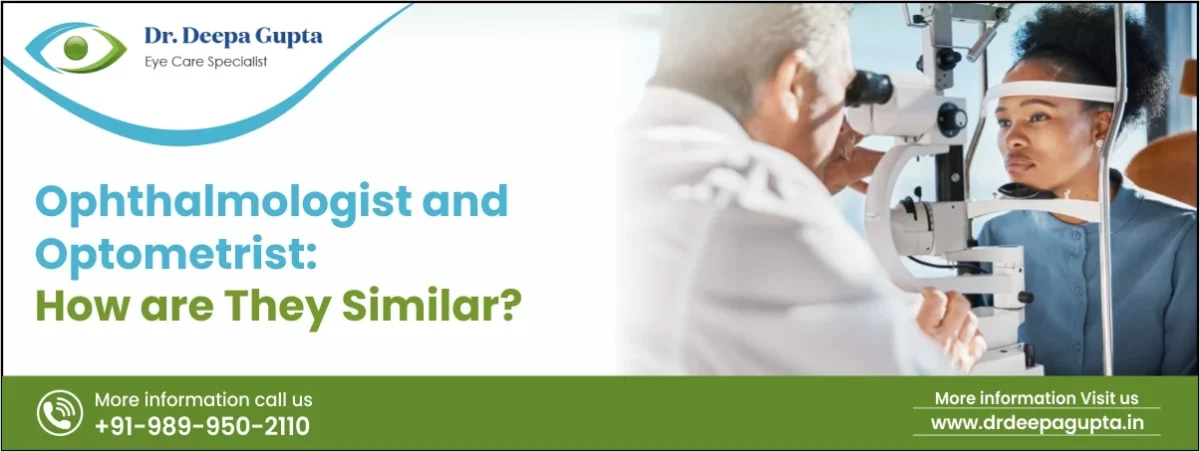Ophthalmologist and Optometrist: How are They Similar?

There are two types of eye specialists namely Ophthalmologists as well as Optometrists. Both of them involve an eye examination by diagnosis and treatment of various eye-related issues. Both of them have different training and expertise areas. However many are confused about whether to have an annual eye examination and where to go, to an optometrist or an ophthalmologist. The answer to this confusion is your reason to visit an eye specialist. Let us discuss this in detail.
An Optometrist
An optometrist is a doctor of optometry and is a primary care provider for your routine eye checkups. They focus on general vision-related issues and common health care for the eyes. The programs are completed in four years to get an optometry degree. Some optimists get additional clinical training as well after the completion of the course. Optometrists have many specialties that include.
- Pediatric optometry offers treatments for babies, toddlers, and children.
- Neurooptometry that treats vision problems due to brain injury
- Low-vision optometry offers devices and strategies that can help improve your quality of life if you have low vision and cannot perform activities.
An Ophthalmologist
These are medical doctors who can treat complicated eye conditions with surgery or many other procedures. They attend medical school and after that have a one-year internship followed by a one to two-year fellowship. There are many specialties of ophthalmology as well like:
- Paediatric ophthalmologists treat eye issues in children and can perform surgeries on them as well who are suffering from crossed eyes or cataracts.
- A Neuro-ophthalmologist is a doctor who deals with eye issues that are due to brain or optic nerves like drooping eyes, migraines, eyelid spasms, and uncontrolled blinking.
- Ocular oncologists are doctors who diagnose and treat cancers of the eyelids, eyes, and eye sockets.
Services Offered by Ophthalmology
They are experts in offering complete eye care services including:
- Vision services like eye exams
- Medical eye care services for many conditions like iritis, glaucoma and chemical burns
- They offer surgical eye care services for crossed eyes, trauma, glaucoma, cataracts and many other eye problems.
- They diagnose and treat almost all eye conditions associated with arthritis and diabetes
- They are also plastic surgeons who conduct procedures to correct droopy eyes or to smoothen out wrinkles.
Optometrists and Ophthalmologists are not the same
Many think that both of them are the same and are often misunderstood, however, both deal with eyecare and vision care, but many misconceptions exist. Both of them serve important roles in eye care and have training and skills that are quite different. Mainly what makes them different is that optometrists focus on primary vision care and include everything from vision testing to diagnosing, treating, and managing vision-associated problems. On the other hand, ophthalmologists examine all eye conditions, perform surgeries provide prescriptions, and also fit eyewear contact lenses to correct issues.
Optometrists can diagnose and treat conditions including:
- Inflammation of the cornea
- High ocular pressure because of glaucoma
- A chalazion
- Allergies that affect the eyes
- Strabismus
Who Among Optometrists and Ophthalmologists is Better?
Neither profession is better than the other and there is no comparison in terms of this. Both Optometrists and ophthalmologists have different jobs and also have different responsibilities. It would be best to book an appointment with an optometrist for specific eye issues, and an ophthalmologist for many others. Both are in some way similar as well as optometrists and ophthalmologists can diagnose, treat, and manage ocular conditions.
Optometrists are trained and have expertise in primary eye care, on the other hand, ophthalmologists get trained in specific eye issues and can perform surgical intervention if needed. These professionals might have different roles as well as diverse educational backgrounds, but they all have your eye’s best interests in mind.
When to Visit an Ophthalmologist?
Eye conditions that affect vision can appear at any time in your lifetime irrespective of age, however they are unnoticeable at first and are difficult to detect. That’s why it is vital to see an ophthalmologist for a complete medical eye exam by the age of 40. It is vital to have a complete eye checkup by an expert which will be your step forward towards saving your eyesight. if you experience:
- Deceased vision
- Dark curtain
- Bulging if one or both eyes
- Distorted vision
- Diabetes mellitus
- Double vision
- Excessive tears
- Eyelid abnormalities
- Family history of eye condition
- High BP
- HIV or AIDS
- Misaligned eyes
- Loss of peripheral vision
- Pain in the eye
- Unusual red eye
Conclusion
If you are seeking an eye doctor then it is necessary for you to see the difference between an optometrist and an ophthalmologist and then select out of the two. Ophthalmologist vs Optometrist details above can help you to know exactly where you have to go. Dr Deepa Gupta is among the best ophthalmologists in Gurgaon. She is trusted and preferred by many, is proficient in many inpatient and outpatient treatments, and successfully performs simple and complex procedures.
Dr Deepa Gupta is counted among the best eye surgeons ,having experience of many years in all kinds of cataract surgeries, that are, stitchless along with the implantation of many intraocular lenses. She is well trained specifically at corneal transplants comprising lamellar corneal transplants DALK and DSAEKs. Her vast many years of experience in refractive surgery for the removal of glasses comprises customized LASIK, PRK, i-LASIK, and SMILE procedures along with Implantable contact lenses.
